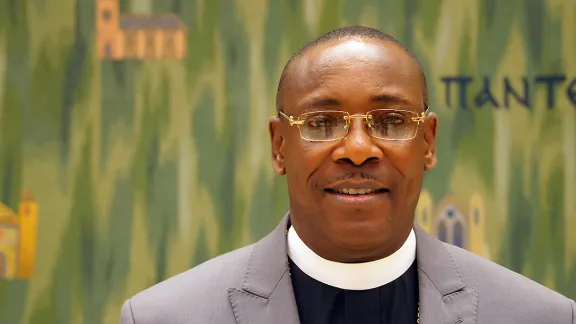
Lutheran Church of Nigeria Archbishop Christian Ekong. Photo: LWF/S. Gallay
Increased Insurgency Obscures Progress in Other sectors
(LWI) – During a visit to The Lutheran World Federation (LWF) early this year, Lutheran Church of Nigeria (LCN) Archbishop Christian Ekong spoke to Lutheran World Information (LWI) about the church’s role as Nigeria prepares for general elections on 14 February 2015.
What are your major concerns as Nigeria prepares for elections this February?
This will be the fifth democratic general election since 1999, which marked the end of long periods of military rule. Over the successive periods, there have been huge improvements on civic education, the electorate exercising their right to vote, and the actual voting. The last election [2011] was generally acclaimed as free, fair and credible. Regretably, election violence occurred in parts of the country and lives were lost.
Inevitably, there are strong opposition candidates this time round against the incumbent ruling party and the President, and that is good in our growing democratic process. It is true insurgency [Boko Haram] in the north has increased, but let’s not forget the significant achievements in other vital development sectors. By early 2014, over 60 percent of the population of over 170 million people had access to clean drinking water compared to about 57 percent in 2011. Internet access has improved from 30 percent to around 55 percent coverage, and this is growing; sanitation has improved too.
National security matters a lot, but we also know the opposition has often used this sector to distract the country’s governance. After this election, we predict that the insurgencies will reduce or even come to an end.
What role is your church, other churches and faith communities playing to encourage citizens’ participation in the election process?
Despite all the dialogues for peaceful co-existence between Muslims and Christians, political class and the ordinary people, sometimes we seem to be getting nowhere but that does not mean that we are not making progress.
Last December [2014] the mainline churches of the Christian Council of Nigeria (CCN), including the Lutheran churches, conducted a joint civic education workshop on observing the forthcoming elections. We achieved our goal of creating awareness about participation in the election processes by all eligible citizens including Christians. We have established a framework that the thousands of church leaders, men, women, youth and theologians we mobilized now use in the congregations and communities. There is growing enlightenment in the population about the need for violent-free elections; and that the ballot should never be bought [exchanged for money] but is the voter’s power to choose the next government. These messages are being greatly appreciated.
Apart from that we continue as a church to pray for peaceful elections in the country. We also create opportunities to visit our political leaders, and remind them of their obligation as elected leaders to be accountable and transparent.
As a person of faith, I see a better future for Nigeria because of our concerted effort to strengthen the country’s democratic basis.
How does the Lutheran church contribute to cultivating a culture of leadership renewal, accountability and good governance in both church and society?
Good governance is an issue of attitude. If you don’t have the right attitude, if you don’t uphold moral values, you cannot do well in leadership. We try to talk to our people including our leaders and tell them that wherever you go as a Nigerian, you are suspected to be a corrupt person. We say this stereotype must be broken as it is not true of so many Nigerians. We remind our leaders that political leadership is about serving the nation and its people: it is not about accumulating individual wealth.
In collaboration with civil society organizations, we organize leadership workshops to discuss the values of honesty, accountability, transparency, human justice, peaceful co-existence and contentment. We want our leaders to understand that we cannot reclaim what has been lost expect through the right values. This is especially important as our immense oil and other resources do not translate into equitable distribution of national wealth.
How can the Lutheran church nurture social cohesion in a multi-ethnic, multi-faith Nigeria?
LCN is greatly involved in youth empowerment because we see the need to really affect this age group positively for the future of the church. Poverty reduction remains a major challenge in Nigeria; therefore creating education and work opportunities for young people becomes critically important. We are also supporting women’s empowerment through several investment and income-generating initiatives. Overall, education is one of our major empowerment tool and I am delighted to see that the growth of LCN primary, secondary and seminary education has enabled us to start plans to establish a Lutheran university. We look at all these as our contributions to support Nigeria to come of out of its unstable base.
The Lutheran churches in Nigeria are also involved together with our global and local partners in the initiative to eradicate malaria which is a killer disease [over 200,000 deaths per year according to the Ministry of Health]. We facilitate free medical clinics, education on malaria and distribution of mosquito nets, as well as some aspects of HIV and AIDS awareness.
LCN was the first faith-based organization to break the silence as far as climate change is concerned in Nigeria and we are advancing in our advocacy in this area, and gaining more partners on board.
We see every public worship as an opportunity for the Lutherans to pray for Nigeria, for the country’s faith and political leadership and for global peace, because no nation thrives in violence, insurgency and insecurity.
We count on the prayers of the global Lutheran communion as we enter elections.
The LCN has been a member church of the LWF since 1973. It has around 150,000 members in 14 dioceses located mainly in Southern Nigeria. Archbishop Christian Ekong also serves as president of the Lutheran Communion in Central and Western Africa (LUCCWA), a regional body of the LWF.


